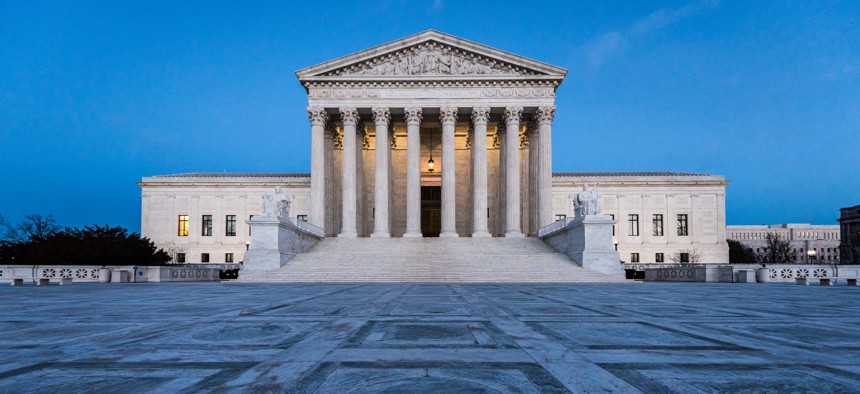States Ask Supreme Court to Consider Challenge Over SALT Cap

The U.S. Supreme Court building. GETTYIMAGES.COM/ Geoff Livingston
It's the latest development in a case that four states have brought against the $10,000 limit on the state and local tax deduction.
Four states challenging the $10,000 cap on a federal deduction for certain state and local taxes are turning to the U.S. Supreme Court in an attempt to keep their case alive.
New York's governor and attorney general said Monday that their state, along with Connecticut, Maryland and New Jersey, have filed a petition asking the high court to review a federal appeals court decision from last year rejecting their claims that the restriction on the tax break is unconstitutional.
This latest move in the case comes as Democrats in Congress have in recent months tried to agree on a plan to dial back the limit on the deduction as part of a massive domestic spending package they're trying to pass. The so-called Build Back Better legislation faltered near the end of last year after a key senator voiced opposition.
The legal challenge dates back to 2018, the year after Republicans pushed through a federal tax overhaul that included the cap. Prior to that time, taxpayers could claim the deduction against their state and local property taxes and either income or sales taxes without the limit.
Taxpayers in a handful of Democrat-leaning states that tend to have higher taxes and earners compared to others are among those who stand to benefit most if the cap were to be ended or raised.
Elected officials from those states, including the four involved in the lawsuit, have pushed to lift the cap since it was imposed, with some arguing that Republicans backed the policy to punish "blue" states, or to coerce them into cutting taxes and eliminating public programs.
The legal challenge by the four states makes claims along these lines. It also contends that the tax law unconstitutionally intruded in other ways on the power of state governments to set their own tax policies.
“We filed this lawsuit to protect millions of New Yorkers from this harmful, misguided, and blatantly political attack. New York will not be bullied into paying more than its fair share," New York Attorney General Letitia James, a Democrat, said in a statement.
A version of Democrats' budget legislation that cleared the House in November calls for raising the cap to $80,000 in the years ahead. But the bill derailed in the Senate in December when U.S. Sen. Joe Manchin, of West Virginia, a crucial Democratic vote in the closely divided chamber, came out against it.
Now there are signs that Manchin could reengage in talks over the package, Axios reported over the weekend.
Meanwhile, other senators have put forward alternative ideas to expand the state and local tax deduction, proposing that income limits be put in place to restrict those who have access to it. But it's unclear at this point how the Senate plan might look if negotiations over the broader package rev up again and yield a deal.
If the cap is raised or lifted, higher-income households would benefit the most, according to multiple analyses. Republicans have seized on this point to bash Democrats, who are positioning themselves as champions of working class and lower-income Americans.
At the same time, budget watchdogs have criticized the gimmicky nature of some of Democrats' SALT rollback proposals and have raised concerns about how they will contribute to ongoing federal deficits.
Bill Lucia is a senior editor for Route Fifty and is based in Olympia, Washington.
NEXT STORY: Blockchain Organization Tests Web3 Premise by Hosting NYC Data






